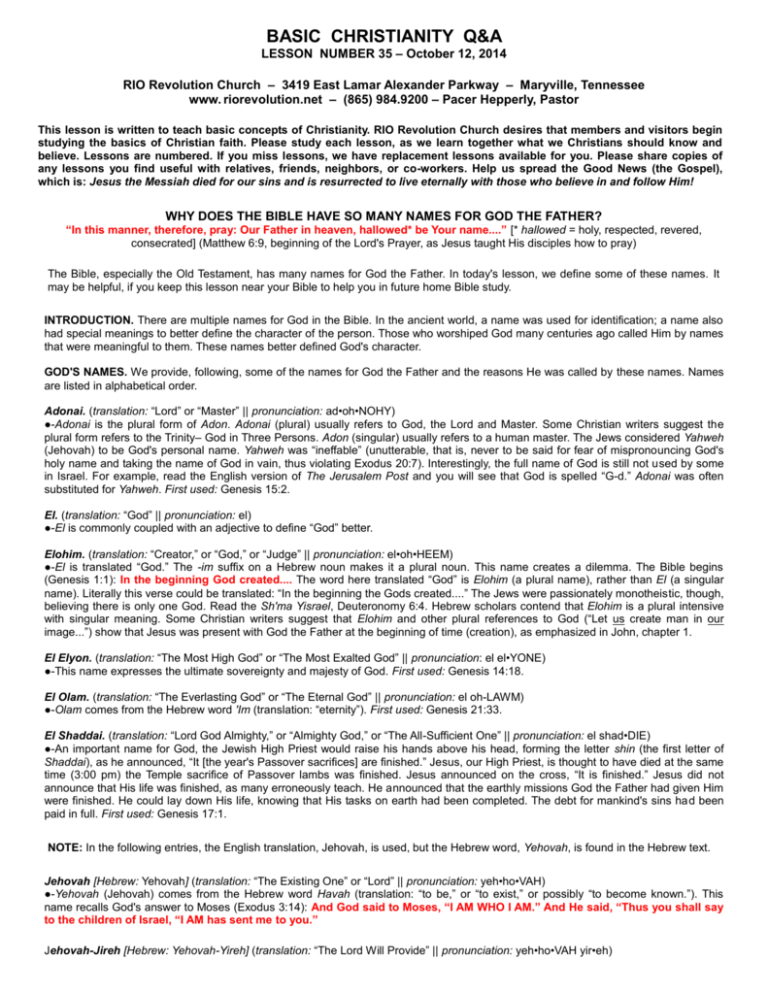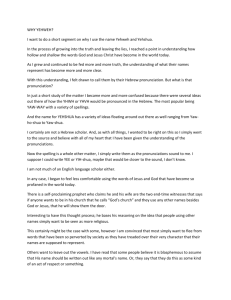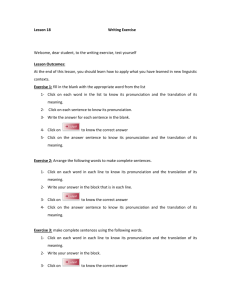Why does the bible have so many names for God
advertisement

BASIC CHRISTIANITY Q&A LESSON NUMBER 35 – October 12, 2014 RIO Revolution Church – 3419 East Lamar Alexander Parkway – Maryville, Tennessee www. riorevolution.net – (865) 984.9200 – Pacer Hepperly, Pastor This lesson is written to teach basic concepts of Christianity. RIO Revolution Church desires that members and visitors begin studying the basics of Christian faith. Please study each lesson, as we learn together what we Christians should know and believe. Lessons are numbered. If you miss lessons, we have replacement lessons available for you. Please share copies of any lessons you find useful with relatives, friends, neighbors, or co-workers. Help us spread the Good News (the Gospel), which is: Jesus the Messiah died for our sins and is resurrected to live eternally with those who believe in and follow Him! WHY DOES THE BIBLE HAVE SO MANY NAMES FOR GOD THE FATHER? “In this manner, therefore, pray: Our Father in heaven, hallowed* be Your name....” [* hallowed = holy, respected, revered, consecrated] (Matthew 6:9, beginning of the Lord's Prayer, as Jesus taught His disciples how to pray) The Bible, especially the Old Testament, has many names for God the Father. In today's lesson, we define some of these names. It may be helpful, if you keep this lesson near your Bible to help you in future home Bible study. INTRODUCTION. There are multiple names for God in the Bible. In the ancient world, a name was used for identification; a name also had special meanings to better define the character of the person. Those who worshiped God many centuries ago called Him by names that were meaningful to them. These names better defined God's character. GOD'S NAMES. We provide, following, some of the names for God the Father and the reasons He was called by these names. Names are listed in alphabetical order. Adonai. (translation: “Lord” or “Master” || pronunciation: ad•oh•NOHY) ●-Adonai is the plural form of Adon. Adonai (plural) usually refers to God, the Lord and Master. Some Christian writers suggest the plural form refers to the Trinity– God in Three Persons. Adon (singular) usually refers to a human master. The Jews considered Yahweh (Jehovah) to be God's personal name. Yahweh was “ineffable” (unutterable, that is, never to be said for fear of mispronouncing God's holy name and taking the name of God in vain, thus violating Exodus 20:7). Interestingly, the full name of God is still not used by some in Israel. For example, read the English version of The Jerusalem Post and you will see that God is spelled “G-d.” Adonai was often substituted for Yahweh. First used: Genesis 15:2. El. (translation: “God” || pronunciation: el) ●-El is commonly coupled with an adjective to define “God” better. Elohim. (translation: “Creator,” or “God,” or “Judge” || pronunciation: el•oh•HEEM) ●-El is translated “God.” The -im suffix on a Hebrew noun makes it a plural noun. This name creates a dilemma. The Bible begins (Genesis 1:1): In the beginning God created.... The word here translated “God” is Elohim (a plural name), rather than El (a singular name). Literally this verse could be translated: “In the beginning the Gods created....” The Jews were passionately monotheistic, though, believing there is only one God. Read the Sh'ma Yisrael, Deuteronomy 6:4. Hebrew scholars contend that Elohim is a plural intensive with singular meaning. Some Christian writers suggest that Elohim and other plural references to God (“Let us create man in our image...”) show that Jesus was present with God the Father at the beginning of time (creation), as emphasized in John, chapter 1. El Elyon. (translation: “The Most High God” or “The Most Exalted God” || pronunciation: el el•YONE) ●-This name expresses the ultimate sovereignty and majesty of God. First used: Genesis 14:18. El Olam. (translation: “The Everlasting God” or “The Eternal God” || pronunciation: el oh-LAWM) ●-Olam comes from the Hebrew word 'Im (translation: “eternity”). First used: Genesis 21:33. El Shaddai. (translation: “Lord God Almighty,” or “Almighty God,” or “The All-Sufficient One” || pronunciation: el shad•DIE) ●-An important name for God, the Jewish High Priest would raise his hands above his head, forming the letter shin (the first letter of Shaddai), as he announced, “It [the year's Passover sacrifices] are finished.” Jesus, our High Priest, is thought to have died at the same time (3:00 pm) the Temple sacrifice of Passover lambs was finished. Jesus announced on the cross, “It is finished.” Jesus did not announce that His life was finished, as many erroneously teach. He announced that the earthly missions God the Father had given Him were finished. He could lay down His life, knowing that His tasks on earth had been completed. The debt for mankind's sins had been paid in full. First used: Genesis 17:1. NOTE: In the following entries, the English translation, Jehovah, is used, but the Hebrew word, Yehovah, is found in the Hebrew text. Jehovah [Hebrew: Yehovah] (translation: “The Existing One” or “Lord” || pronunciation: yeh•ho•VAH) ●-Yehovah (Jehovah) comes from the Hebrew word Havah (translation: “to be,” or “to exist,” or possibly “to become known.”). This name recalls God's answer to Moses (Exodus 3:14): And God said to Moses, “I AM WHO I AM.” And He said, “Thus you shall say to the children of Israel, “I AM has sent me to you.” Jehovah-Jireh [Hebrew: Yehovah-Yireh] (translation: “The Lord Will Provide” || pronunciation: yeh•ho•VAH yir•eh) ●-Abraham called God Jehovah-Jireh– “The Lord Will Provide” – because God provided a substitute (a ram) on Mount Moriah to serve as the sacrifice in place of Abraham's son, Isaac. Used only once: Genesis 22:14. Jehovah-Mekoddishkem. (translation: “The Lord Who Sanctifies You” or “The Lord Who Sets You Apart” || pronunciation: yeh•ho•VAH M-qadash) ●- Mekoddishkem comes from the Hebrew qadash (translation: “sanctify, holy, dedicate.”) Sanctification is the separation of a person to be dedicated to something (Someone) holy. Jehovah-Mekoddishkem recognizes that Jehovah (God) can set any person aside as a holy one. In Heaven, resurrected and raptured persons will be called “saints.” “Saint” comes from the Greek word hagios, and means “a most holy thing.” Only a final cleansing from God can transform you into a saint (hagios), an eternal soul worthy to be in the presence of God. First used: Exodus 31:13. Jehovah-Nissi. (translation: “The Lord My Banner” or “The Lord My Miracle” || pronunciation: yeh•ho•VAH nis•SEE) ●-Nissi is translated as “banner.” Moses proclaimed that Jehovah was Israel's banner (nissi) under which the Israelites defeated the Amalekites. We may use Jehovah-Nissi as our banner of encouragement and hope. Used once: Exodus 17:15. Jehovah-Raah. (translation: “The Lord My Shepherd” or “The Lord My Friend” || pronunciation: yeh•ho•VAH raw•AW) ●-Raah is translated “shepherd” (sometimes “friend”). God cares for His people, as a shepherd cares for his flock. First used: Genesis 48:15. Jehovah-Rapha. (translation: “The Lord Who Heals” || pronunciation: yeh•ho•VAH raw•FAW) ●-Rapha can mean “to restore, to heal, to make healthful.” Jesus is often called “the Great Physician.” First used: Exodus 15:26. Jehovah-Sabaoth. (translation: “The Lord of Hosts” or “The Lord of Powers” || pronunciation: yeh•ho•VAH se•BAH•oht) ●-Sabaoth is translated as “armies” or “hosts.” This name could be translated with equal correctness as “The Lord of Armies.” This name underscores God's sovereignty, power, and ultimate rulership over every army and every force, whether physical or spiritual. First used: 1 Samuel 1:3. Jehovah-Shalom. (translation: “The Lord Is Peace” || pronunciation: yeh•ho•VAH shaw•LOME ) ●-Shalom is the well-known Hebrew word for “peace.” Jehovah-Shalom is the name of an altar built by Gideon in Ophrah. Shalom comes from the Hebrew Shalem (English: Salem), originally meaning “to be complete.” The -salem portion of Jerusalem comes from this word. Used once: Judges 6:24. Jehovah-Shammah. (translation: “The Lord Is There” || pronunciation: yeh•ho•VAH SHAWM•mah) ●-Shammah is derived from sham (translation: “there”). Jehovah-Shammah is a symbolic name for earthly Jerusalem (“The Lord is there”). Used once: Ezekiel 48:35. Jehovah-Tsidkenu. (translation: “The Lord Our Righteousness” || pronunciation: yeh•ho•VAH tsid•KAY•noo) ●-Tsidkenu can be translated “stiff, straight, righteous.” Jehovah-Tsidkenu can be translated “The Lord who is our Righteousness.” First used: Jeremiah 23:6. Qanna El. (translation: “Jealous God” || pronunciation: kan•NAW el) ●-Qanna is usually translated as “jealous” (or, perhaps, “envious”). This word usually relates to jealousy in marriage. God described Himself as Israel's Husband. When Israel chased after other gods, she committed spiritual adultery, and God was jealous of His unfaithful wife. He has always been jealous in that He wants all of our praise for Him, not any praise for false gods. First used: Exodus 20:5. Yah. A shortened version of Yahweh. See Yahweh (next entry). May also be spelled Jah (pronunciation: yah). Our word “Hallelujah” combines the Hebrew hallalu (“praise”) and Jah (“the Lord”) = “Praise the Lord.” Yahweh. (translation: “Lord” or “Jehovah || pronunciation: yah•weh) ●-This name, used more than 6,500 times in the Bible, is the most common name for God. The Jews considered Yahweh (Jehovah) to be God's personal name. Yahweh was “ineffable” (unutterable, not able to be said for fear of mispronouncing God's holy name, thereby taking the name of God in vain). Adonai was often substituted for Yahweh. Hebrew used only consonants, not vowels. Yahweh was represented by four consonants (translated to English letters) – YHWH (sometimes written YHVH). The four Hebrew letters– pronounced yud, hay, vav, hay-- formed the Sacred Tetragrammaton (the four letters which spelled Yahweh). When Jesus was crucified for blasphemy, Pilate wrote the charges against Jesus on the titulus (title board) nailed to Jesus' cross. The four Hebrew words, which announced Jesus' “crime,” started with letters of the Sacred Tetragrammaton. When the Jewish priests saw the charges, they immediately recognized the Sacred Tetragrammaton and begged Pilate to change the wording to anything other than what was written. Pilate refused. To the horror of the Jewish priests, Jesus was crucified under the name of God (YWHW– Jehovah). We usually say “Jehovah” instead of “Yahweh,” because this name is easier for English-speaking people. One of the Ten Commandments about not taking the name of the LORD in vain (Exodus 20:7) uses Yehovah (YHWH, YHVH) as the name of God. Yahweh was sometimes shortened to Yah, and you may see this shortened name (especially in music). Letters of the Sacred Tetragrammaton are written to the right. Hebrew is read from right to left (opposite of English). All Scriptures are taken from the NEW KING JAMES VERSION (NKJV), © Thomas Nelson Publishers, Nashville, Tennessee. Holy Scriptures are reproduced in red boldface font. ●-If you have questions about salvation or re-dedication of your life to serve God or if you wish to be counseled, call the RIO Revolution Church office at (865) 984.9200, email the pastoral staff at www. riorevolution.net/contact-us/ , or come to the altar during any worship service. ●-If you have questions, comments, or suggestions concerning this lesson series, contact the author, Raymond Finney, at (865) 984.1424 or raymondfinney@ charter.net . The author assumes full responsibility for any error or misstatement. qa-35








